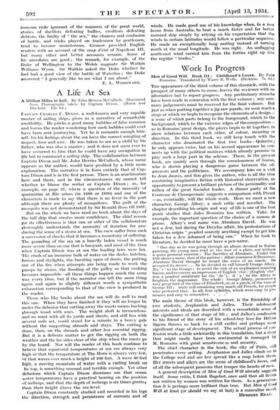Work In Progress
THE appearance of the third volume of this chronicle, with the prospect of many others to come, leaves the reviewer with no alternative but to report progress. Any preliminary remarks have been made in connexion with the first volume ; any sum- mary judgements must be reserved for the final volume. But
just as when putting together a jig-saw puzzle, we soon reach a stage at which we begin to recognize the elements.of a design—. a sense of which parts belong to the foreground, which to the background, which to the extreme edges of the composition— so in Romains' great design, the pieces begin to fit together, to show relations between each other, of colour, meaning or direction. In this third book, we still keep touch with the character who dominated the first two books—Quinette ; he only appears twice, but on his second appearance he con- nects up with the political motives which already promise to play such a large part in the scheme. These, in the present book, are mainly seen through the consciousness of Gurau, who is shown playing a dangerous game between the oil- interests and the politicians. We accompany him on a visit to Jean Jaures, and this gives the author, who is all the time combining imaginative fiction With historical observation, an opportunity to present a brilliant picture of the personality and milieu of the great Socialist leader. A dinner party at the Comtesse de Champcenais' suggests a comparison with Proust —as, eventually, will the whole work. Here we meet a new character, George Allory, a snob critic and novelist. The chapter describing his origin and way of life is one of the best ironic studies that Jules Romains has written. Take, for example, the important question of the choice of a nomme de plume. Allory's real name was Abraham David. He was not a Jew, but during the Dreyfus affair, his protestations of Christian origin " pvailed scarcely anything except to get him taken for a Jew fishamed of being one." When he took to literature, he decided he must have a pen-name.
"One day as he was going through an album devoted to Italian painting, the young man read at the foot of a plate, not without a quite personal emotion.: The Sacrifice of Abraham. Under thie title shone a name, that of the painter : Allori (surname Ii Bronzino). Abraham David thought he heard the voice of an oracle. He accepted its decree. So he decided to call himself -George Allory. No 's' to the George : to avoid the risk of an unpleasant-sounding liaison, andto convey an impression of English chic.' (English chic' was a prudent substitute for the de '). A y to the Allory to heighten the impression. The whole : George Allory, presented a very groat lord of the time of Elizabeth, or, at a pinch, of the time of George III; while still remaining very much old French, for people who preferred that. In all, four syllables, which were easy to pro- nounce and easy to remember. . . ."
The main theme of this book, however, is the friendship of two students, Jerphanion and Jallez. Their adolescent interests and ideals are described with a remarkable sense of the significance of that stage of life ; and Jallez's confession to his friend of the story of his school-boy love for Helene Sigeau throws us back to a still earlier and perhaps more significant stage of development. The actual process of con- fession reads a little awkwardly in this translation, but a story that might easily have been sentimental is managed by M. Romains with great sensitiveness and security. The chief character in the book, the city of Paris, still penetrates every setting. Jerphanion and Jallez climb on to the College roof and see her spread like a map below them. Her streets and alleys are the scene of childhood's loves, and of all the subsequent passions that temper the hearts of men.
A general description of Men of Good Will already suggests itself. Some critic, I think Bagehot, once said that all fiction not written by women was written for them. As a generalisa- tion it is perhaps more brilliant than true. But Men of Good Will at least (pr should we say at last) is a masculine novel HERBERT READ.
















































 Previous page
Previous page